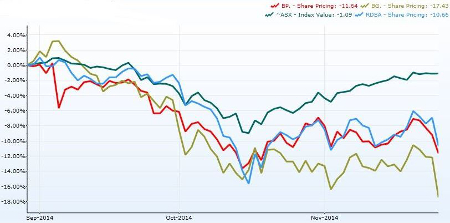Is the oil sector a great contrarian play?
28th November 2014 14:56
by Harriet Mann from interactive investor
Share on
It seems there's more pain to come for those dependent on high oil prices, initially, at least. OPEC's refusal to cut production, choosing instead to prioritise market share over short-term profitability, sent prices plummeting again, with Brent Crude down nearly 7% at $72.58 per barrel. But the recent downturn is part of the commodity cycle, which should in time mean that the trend will reverse.
OPEC produces three million barrels of oil per day (bopd), a third of global oil production. If cartel did agree to cut production across the board, they would be giving up their market share to big players like Russia and America. OPEC confirmed that there was no set target price, but emphasised that for optimum economic wellbeing, oil prices should be stable; "at a level which did not affect global economic growth but which, at the same time, allowed producers to receive a decent income and to invest to meet future demand".
This is a victory for Saudi Arabia which has the lion's share of production, industry expert Malcolm Graham Wood told Interactive Investor. "I am not quite as bearish as most", the analyst said, reminding investors that production from OPEC was nearly 31 million bopd a couple of months ago. This has been cut by up to 700,000 bopd, mainly due to Libya losing production volume. The fall in price could see less oil rigs being operated in America, he warns, which could also reduce supply pressure further. He also sees demand picking up by around 500,000 bopd thanks to an increase in GDP, itself a result of lower oil prices.

(Click to enlarge: Source: S&P Capital IQ)
"You have probably got a one million bopd pick-up through supply and demand without doing anything at all," he said, believing that the oil price still has to find the correct level.
How low can it go?
"In the short-term there is no reason why oil won't fall further. It could easily come down to $65 per barrel in the short-term, but equally you could be back up to $80 per barrel by the second half of next year," says Graham-Wood.
But Panmure Gordon reckons between one million and 1.5 million bopd will need to leave the market in order for it to find its own level, meaning the price will have to fall further before it becomes uneconomical for companies to operate. The analysts said:
"We believe OPEC is likely making a serious misjudgement of just how low the oil price can fall if it is price that is to balance the market, since the relevant price is not the one that will engender sufficient investment to generate modest growth in supply capacity for the medium and long-term. That is most likely to be in the $80-$100/bbl range, we believe.
"Instead it will be the price required to force production from the market by making it sufficiently cash negative to force it to be shut in. Given the cost structure in the industry that price is likely to prove a small fraction of the required full-cycle reinvestment price."
The implications
But Thursday's update does not rule out OPEC action for good. Panmure reckons the oil price will continue south, even revisiting 2008's lows of $40 per barrel. This environment will eventually force OPEC to cut production to much lower than if the body acted now, says the broker.
The plummet in oil prices could make the high-cost commodity more attractive to buyers who have been holding off for cheaper prices since the bear market started to play out in the summer. However, these discounted levels do not solve the twin headwinds of over-supply and slowing demand growth.
By pushing oil prices down further, the decision is bad news for countries heavily dependent on oil exports and companies with little diversity. Reports also circled that US shale oil producers may also start to default on their debt repayments as a result. But not everyone suffers, with the $30 drop in oil prices since June expected to boost developed economies by up to 1.5% and China by 2%, says Shore Capital. Real incomes will be given a "tremendous" boost, it adds, driving economic growth.
Where to look for bargains
"If you can keep your head then the second half of 2015 already is starting to look better," Graham-Wood suggests.
"I don't think this is a long-term problem, in fact I think this is an opportunity and I would lock in. If I was the Chinese I would be buying crude oil to put into long-term strategic stock piles over the next couple of months."
Westhouse Securities agrees: "We argue that for investors with a bit more patience and perhaps a more contrarian strategy, there is now an opportunity to cherry-pick stocks at large discounts."
The analysts point to , , and , saying the stocks are oversold but can ride out the latest storm with important catalysts approaching in the near-term.
"We also highlight companies that are sitting on a material discounted discovered resource base with a high chance of progressing towards final development/investment decision and/or future monetisation - Faroe Petroleum (FPM) and ."
"We maintain our view that oil is a high-cost commodity, one that cannot trade at low prices for prolonged periods of time. The current level, in our view, will lead to capex cuts (there is already evidence of this) and slowing production growth and reserve replacement. This will have to be countered by the oil price reversing its downward movement."
This article is for information and discussion purposes only and does not form a recommendation to invest or otherwise. The value of an investment may fall. The investments referred to in this article may not be suitable for all investors, and if in doubt, an investor should seek advice from a qualified investment adviser.